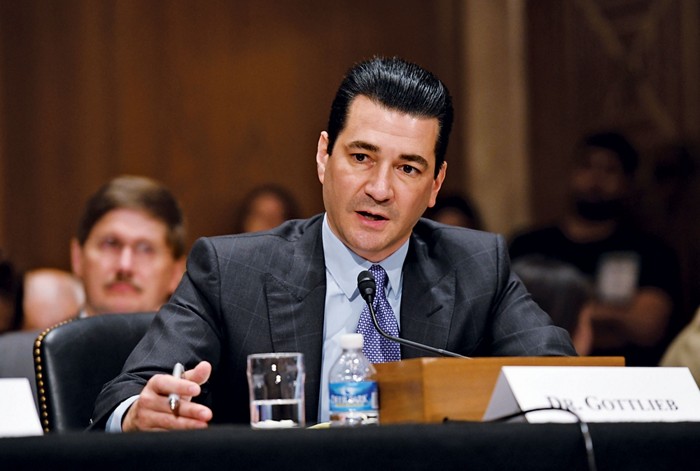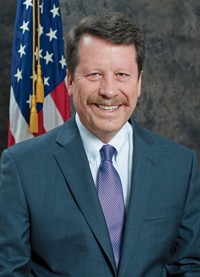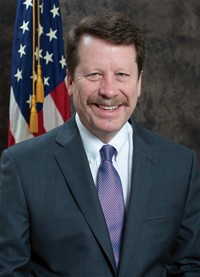Advertisement
Grab your lab coat. Let's get started
Welcome!
Welcome!
Create an account below to get 6 C&EN articles per month, receive newsletters and more - all free.
It seems this is your first time logging in online. Please enter the following information to continue.
As an ACS member you automatically get access to this site. All we need is few more details to create your reading experience.
Not you? Sign in with a different account.
Not you? Sign in with a different account.
ERROR 1
ERROR 1
ERROR 2
ERROR 2
ERROR 2
ERROR 2
ERROR 2
Password and Confirm password must match.
If you have an ACS member number, please enter it here so we can link this account to your membership. (optional)
ERROR 2
ACS values your privacy. By submitting your information, you are gaining access to C&EN and subscribing to our weekly newsletter. We use the information you provide to make your reading experience better, and we will never sell your data to third party members.
Drug Development
FDA commissioner Scott Gottlieb to step down
His brief stint as agency chief brought progress in approving generic drugs and advancing new technologies
by Lisa M. Jarvis
March 8, 2019
| A version of this story appeared in
Volume 97, Issue 10

In a move that has stunned the drug industry, US Food and Drug Administration commissioner Scott Gottlieb is stepping down. In a letter to FDA staff, he said the decision was motivated by a desire to spend more time with his family. He will leave the agency in one month.
Gottlieb, a physician who worked at the FDA during the administration of George W. Bush, came to the commissioner job in mid-2017 after years of working in venture capital and advising companies. The appointment was a departure from previous commissioners, who had primarily worked in public health or academia, says Kenneth Kaitin, director of the Tufts Center for the Study of Drug Development. Although Gottlieb’s relationship to the private sector was scrutinized, “his most significant legacy may be his ability to connect the role of the FDA and the regulated industry,” Kaitin says.
As commissioner, Gottlieb focused much of his time on a few key issues, including lowering overall drug costs by improving the efficiency of generic-drug approvals, identifying solutions to the opioid epidemic, and reducing teen e-cigarette use.
But Gottlieb was also hailed by the pharmaceutical industry for his approach to overseeing new-drug development. “Scott has been a very strong, positive leader of the FDA and was a real champion for the development of innovative medicines for patients,” says Bruce Booth, a partner at the life sciences venture capital firm Atlas Venture.
During Gottlieb’s tenure, the FDA approved a wave of new technologies, including several first-in-class treatments. Those firsts included a gene therapy (Spark Therapeutics’ Luxturna), chimeric antigen receptor T-cell therapies (Novartis’s Kymriah and Gilead Sciences’ Yescarta), an RNA interference therapeutic (Alnylam Pharmaceuticals’ Onpattro), and two tissue-agnostic cancer treatments.
The FDA also green-lighted a record number of drugs under his purview. In 2018, the agency approved 59 new drugs, an all-time high for industry productivity.
Although those products had been in the pipeline long before Gottlieb came on as commissioner, industry experts credit his willingness to cultivate a regulatory culture that supports the development of innovative medicines. “I think he set a tone of looking at new mechanisms, new targets, exploring new approaches to treatment of intractable diseases that has been very rewarding for small companies,” Kaitin says. “The new crop of medicines are not a result of Gottlieb, but ones that come up in the next 5 to 10 years will be.”
As recently as January, Gottlieb denied reports that his departure was imminent. “I’ve heard from friends contacted by an online pharma news pub that’s preparing a story speculating that I’m leaving #FDA,” he tweeted on Jan. 3. “I want to be very clear—I’m not leaving. We’ve got a lot important policy we’ll advance this year. I look forward to sharing my 2019 strategic roadmap soon.”
Advertisement
With his departure, industry insiders are wondering—and worrying about—what will come next for the agency, particularly given President Donald J. Trump’s tendency to pick outsiders for key roles. Many political appointees have eschewed regulations, a direction that Trump avoided with Gottlieb but could revisit.
Some are concerned that Gottlieb’s successes in areas like generic-drug approvals and drug pricing could stall with his departure. “Scott Gottlieb’s departure from FDA is a real disappointment in many ways,” says Stacie B. Dusetzina, a health policy professor at Vanderbilt University School of Medicine. “He has worked hard to push forward some key public health initiatives. He has also done a lot to try to expand competition in the prescription drug market by getting generics approved faster and by promoting the use of biosimilars. I hope that whoever is in the position next will continue to make progress in these areas.”





Join the conversation
Contact the reporter
Submit a Letter to the Editor for publication
Engage with us on Twitter